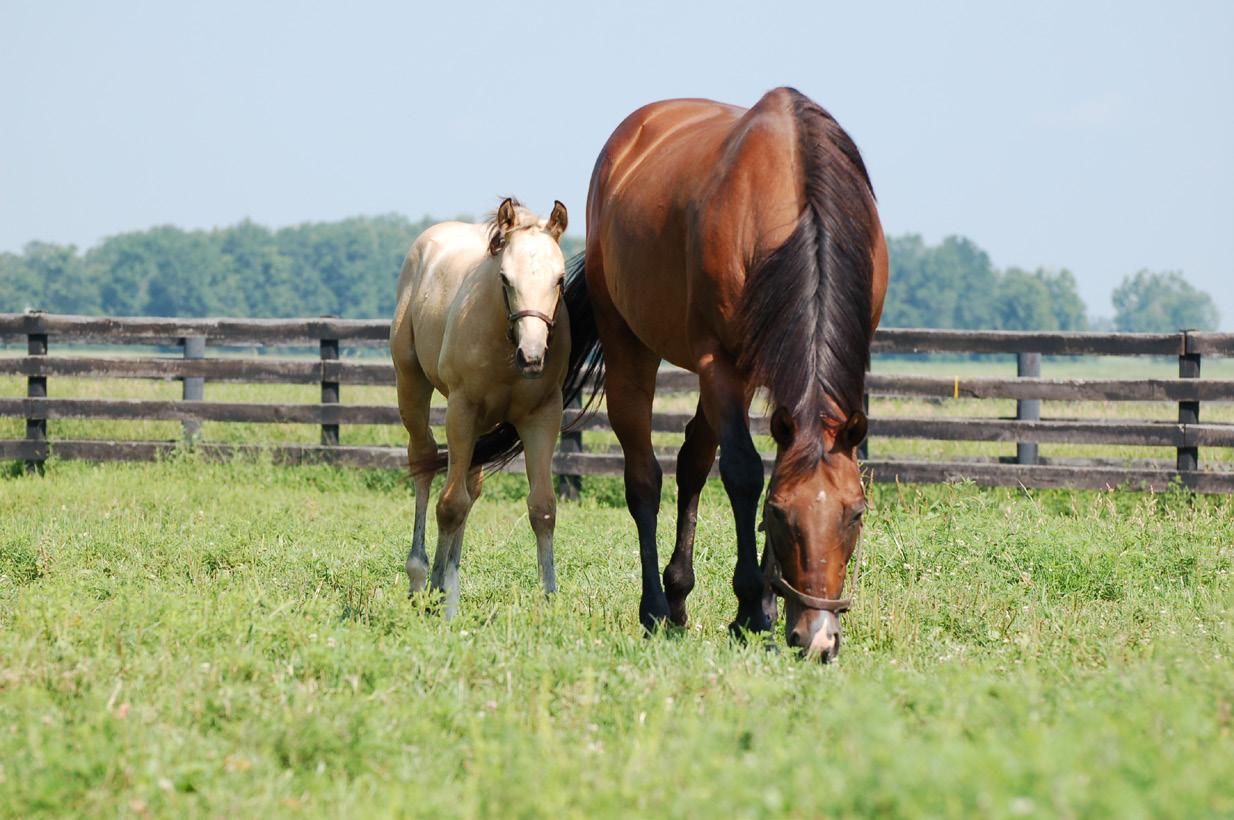
16 minute read
FARM AND FACILITIES EXPO SEPT. 28
University of Kentucky Cooperative Extension Service and Ag Equine Programs will host the annual Farm and Facilities Expo from 3:30 - 8 p.m. EDT Tuesday, Sept. 28, at the famed Spendthrift Farm, 247 Swigert Ave., Lexington. The event is free and open to the public. A meal will be provided for those in attendance. Farm managers and horse owners will have the opportunity to explore visitor booths and see displays for every aspect of horse farm management. Speakers will provide educational talks about farm layout and planning, establishing new pasture and spray options for farms of all sizes. Additionally, Spendthrift Farm personnel will talk about engaging non-horsemen in the racing industry. “We have held this annual field day for the last 12 years and this year’s event promises to be one of the best. Not only will you be able to tour a premier horse farm, but you will see the results of excellent pasture management,” said Ray Smith, PhD, forage extension specialist with UK’s College of Agriculture, Food and Environment. “A priority for the field day will be to show each participant how they can implement the practices at Spendthrift on their own operation, whether large or small.” “In 2019, Spendthrift made the decision to completely re-establish some areas in cool season pasture. This is the best way to have a good pasture, and despite some heavy drought, this farm had great success with it,” said Krista Lea, MS, research analyst and coordinator of the UK Horse Pasture Evaluation
IMAGE COURTESY UK COLLEGE OF AGRICULTURE, FOOD AND ENVIRONMENT.
Advertisement
Program. Please RSVP for food planning purposes. Please email equine@ uky.edu to register. All current COVID protocols will be followed. Please note the 247 Swigert Avenue entrance, not any of the Spendthrift entrances off Iron Works Pike. Those gates will be locked.
| Holly Wiemers, MA, APR, is the communications and managing director for UK Ag Equine Programs.
RACECOURSE MANAGER CERTIFICATION COURSE RESOURCES
Racecourse Manager Certification Program
Free access to videos and presentations
Sign up for RMCP news
Follow the Equine Sports Turfgrass Alliance: @equineturfgrass
THE JOCKEY CLUB MEDALS AWARDED TO UK DEAN, FORMER NATIONAL BASEBALL PRESIDENT
Nancy Cox, University of Kentucky vice president for landgrant engagement and dean of the College of Agriculture, Food and Environment, and Len Coleman, former president of the National League of Professional Baseball Clubs are recipients of The Jockey Club Medal. Through the years, the stewards of The Jockey Club have bestowed the medal upon a select group of individuals in recognition of exceptional contributions to the Thoroughbred breeding and racing industry. The medal is not given every year. The club only bestows it when they think there are people who have done an extraordinary service to the industry. Cox and Coleman received the medals for their exceptional work in co-chairing the nominating committee of the Horseracing Integrity and Safety Authority. “The Horseracing Integrity and Safety Authority was a road none of us had traveled before. For our industry, this was an important moment. As the co-chairs of the committee, Nancy and Len performed an incredible service for our industry,” said Stuart S. Janney III, The Jockey Club chairman. “They got through the whole process, dodging any number of sharks swimming in the water waiting to pounce, depending on the nominations. The outcome and reception has been great.” Congress established the Authority in 2020 as an independent, non-governmental regulatory body, run by an independent board, responsible for standardizing regulations and safety rules nationwide. The nominating committee led by Cox and Coleman completed their work in May with the selection of the Authority’s board of directors. “It is distinct honor to receive this award,” Cox said. “The whole process of working on the nominating committee with Len and the other members was a pleasure. It was a lot of hard work. We reviewed over 160 nominations and came out with a very diverse and effective group. That group of individuals on the board and subcommittee have a passion and will carry through with great success, I’m sure. I would also say that The Jockey Club deserves a huge thanks for the years of striving for what led to the Horseracing Integrity and Safety Act.” Coleman, who is now a member of the Authority’s board, said he appreciates the award.
“Horse racing has been a passion of mine since I was 18,” he said. “The public perception of the integrity of the sport is crucial to the sport’s well-being. HISA is a huge step forward in instilling public confidence.” The Jockey Club awarded the medals earlier this month during its 69th annual Round Table Conference on Matters Pertaining to Racing. Through the years, the Stewards of The Jockey Club have bestowed The Jockey Club Medal upon a select group of individuals in recognition of exceptional contributions to the Thoroughbred breeding and racing industry. The medal was presented annually from 1984 NANCY COX AND STUART S. JANNEY, III, CHAIRMAN OF THE JOCKEY CLUB, AUG. 14, through 1994 and AT THE JOCKEY CLUB CHAIRMAN’S DINNER AT THE NATIONAL MUSEUM OF RACING AND HALL OF FAME. PHOTO CREDIT: THE JOCKEY CLUB/GREGORY FISHER. periodically since then. The list of honorees includes: 1984 Daniel G. Van Clief Jr. 1985 Jean Romanet 1986 Richard L. Duchossois 1987 Jack Van Berg 1988 Dennis Swanson 1989 Joe Hirsch 1990 Dr. Charles Randall 1991 Dr. Manuel A. Gilman 1992 R. Richards Rolapp 1993 Kenneth Noe Jr. 1994 Dr. Larry Bramlage 1998 Alan Marzelli & Nick Nicholson 2003 Hans J. Stahl 2007 Louis Romanet 2014 Tom Durkin 2015 Ogden Mills Phipps 2016 Pierre “PEB” Bellocq | Source: edited news release.
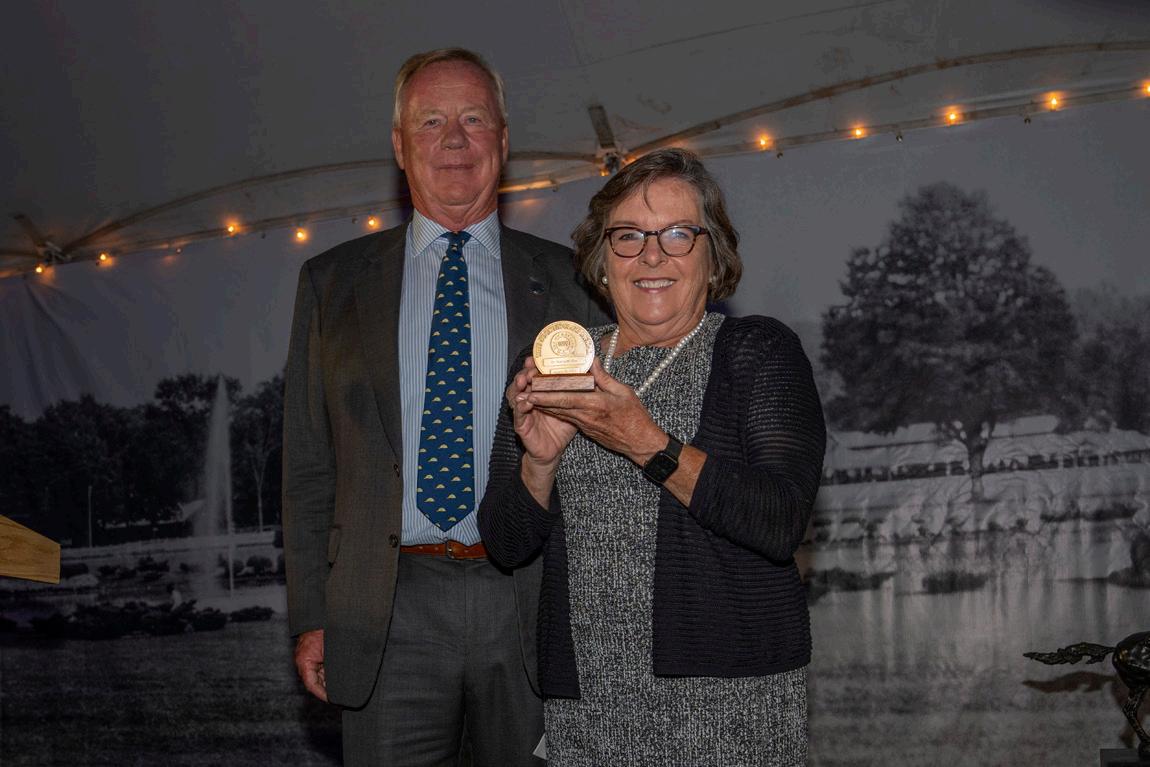
PASTURE RENOVATION IMPROVES FORAGE QUALITY FOR SCHOOL’S HORSES
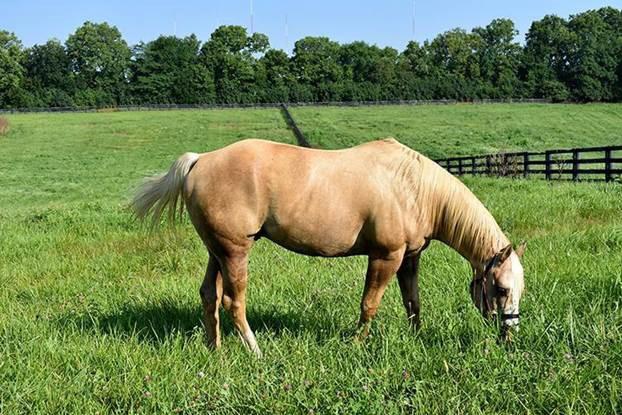
PHOTO BY KATIE PRATT, UK AGRICULTURAL COMMUNICATIONS.
TO VIEW THE VIDEO, CLICK HERE.
Horses at a Central Kentucky career and technical high school have lush paddocks to graze on this school year thanks to help from the University of Kentucky College of Agriculture, Food and Environment. Locust Trace AgriScience Center is a school in Lexington that introduces high school students in Fayette and Woodford counties to many agriculture disciplines. Equine science is one of the more popular areas. During the school year, horses on loan to the school graze the four on-campus paddocks when they are not interacting with students. But with more horses than paddocks, the fields were overgrazed, and it was time to improve them. “Last year, I served as the farm manager, and I knew these paddocks were pretty thin on forages for our horses,” said Nicki Jones, Locust Trace co-op facilitator. “With no students being on campus, we saw it as the prime opportunity to call on the people at UK to walk us through a renovation.” The school contacted Krista Lea, MS, UK horse pasture evaluation program coordinator, and Jimmy Henning, PhD, UK forage extension specialist. They advised the school personnel to kill out the existing vegetation and guided them through reseeding the pastures and managing them for the future. Lea suggested they reseed the paddocks in a tall fescue that could handle the high grazing pressure. Through a donation from Pennington Seed, they secured Lacefield Max Q II, a tall fescue variety developed at UK that contains a novel endophyte. The novel endophyte allows animals to graze the grass without having adverse health effects. Gabriel Roberts, UK field technician, helped the school sew the grass seed. “I like the fact that I can look out and I can see that the horses we have are on good grass,” said Fallon Jackson, Locust Trace equine sciences instructor. “They are getting what they need, and I don’t have to worry about body condition scores going down because the forage that they are eating is not good enough.” Lea continues to advise the school on ways to use pasture rotation to give the pastures ample time for recovery and regrowth. “Each pasture will have a fair number of horses on it with pretty high grazing pressure for a couple of weeks. Then the horses will be rotated off for two to four weeks, and hopefully that will give the pastures plenty of time to regrow,” Lea said. “Even though they are going to have high grazing pressure, by using good management, a dry lot and even feeding some hay in stalls, they should be able to maintain it reasonably well. “ The new grass also will provide teaching opportunities on the importance of quality forages to equine health. “I think it will be a good opportunity to teach the students about the importance of rotation and not overgrazing and that what you do in the wintertime is going to affect what happens in the spring,” Jones said.
| Katie Pratt is an agricultural communications specialist with University of Kentucky’s College of Agriculture, Food and Environment.
AMERICAN HORSE PUBLICATIONS EQUINE INDUSTRY SURVEY DEMONSTRATES STABILITY BASED ON NUMBER OF HORSES OWNED/MANAGED
COMING ON HEELS OF COVID-19 PANDEMIC, SURVEY CAN SERVE AS IMPORTANT BENCHMARK ON HEALTH OF INDUSTRY NOW AND IN FUTURE.
Despite the challenges posed by the COVID-19 pandemic, the equine industry is stable based on the number of horses owned/ managed, according to the results of a survey by American Horse Publications (AHP) sponsored by Zoetis. The survey, which includes responses from 7,267 horse owners/managers, found that the top three issues facing the industry are land use issues, horses in transition or at risk and the increased cost of horsekeeping. And, while vaccination rates are stable, survey respondents indicated they are following updated deworming recommendations and adjusting their frequency if needed. “The results from the 2021 AHP Equine Industry Survey reveal overall stability in the U.S. equine industry in spite of unique challenges posed by COVID-19,” said Jill Stowe, Ph.D., professor of agricultural economics at the University of Kentucky, who analyzed the data and consulted on the results. “Based on respondents’ input on management and issues facing the industry, our leaders have helpful information to guide strategic planning and decision-making for the long-term benefit of the industry.” The survey, which was conducted from January 18 through April 9, 2021, has three primary objectives: to gauge participation trends and management practices in the U.S. equine industry, to ry report owning/managing more horses. This pattern is also consistent with expectations on horse ownership/management one year in the future: 31.1% of respondents in the 18-24 age category expect to own/manage more horses in 2022 than they do this year, while only 10.2% of respondents in the 65+ age category report the same expectation.
EVENT PARTICIPATION
Survey participants indicate that they expect to compete in an average of 4.3 events in 2021, which is less than the 5 competitions reported in the 2018 study. More than 45% of the respondents do not plan on competing at all in 2021, up from 38.7% in 2018.
Horsekeeping Costs
Feed (including both hay and concentrates) continues to be the most frequently identified area in which horsekeeping costs have increased. This is followed by costs of veterinary services (41%) and animal health products (39%), which are stable from the 2018 study. However, the cost of barn supplies has significantly increased since 2018, from 12.2% to 22%. Frequently mentioned sources of increased costs in the “other” category were fencing, building materials and insurance. In addition, 22.2% of respondents identified fuel/transportation as a primary source of increased horsekeeping
identify critical issues facing the equine industry as perceived by those who own or manage horses and to better understand approaches to horse health care. AHP conducted similar surveys in 20092010, 2012, 2015 and 2018.
STABILITY THROUGH THE PANDEMIC
The average respondent owns/ manages about six horses. 75.2% of respondents indicate that the number of horses they currently own/manage is the same as in 2020, and 10.4% own/manage more horses than they did in 2020. When asked about future expectations of ownership, 73% expect to own/manage the same number of horses in 2022, 17.3% expect to own/manage more horses and 9.7% expect to own/manage fewer horses. Comparing this to the 2018 survey, we see an increase in expected stability regarding the number of horses owned/managed.
HORSE OWNERSHIP
Growth in the number of horses owned/managed is more prevalent among respondents in the youngest age group as compared to the oldest group. Similar to previous studies, the frequency of owning/managing more horses in the survey year (2021) than in the previous year (2020) is decreasing with age; 21.8% of respondents in the 18-24 age category report owning/managing more horses in 2021 than in 2020, while only 5.4% of respondents in the 65+ age catego-
costs. It is important to note that if this survey had been conducted later in 2021, when there was a sharp increase in gas and lumber prices, this percentage may have been higher. The rise in horsekeeping costs could force businesses to raise prices even if they don’t want to. Looking at how to accommodate for horsekeeping costs, most respondents reported they will reduce expenditures in other areas of their lives (60%), attend fewer competitions (22.2%) and pursue other income opportunities (21.3%).
ISSUES FACING THE EQUINE INDUSTRY
The most frequently selected issue facing the equine industry was land use issues (43.5%), followed closely by horses in transition or at risk (43.1%), and cost of horsekeeping (42.8%). Frequently mentioned issues in the “other” category include animal rights activists, competition costs, liability and over-regulation. Although there are overarching issues that span the entire equine industry, there are certain issues of heightened concern in particular areas of the country. For example, zip code regions 4 (Indiana, Kentucky, Michigan and Ohio) and 7 (Arkansas, Louisiana, Oklahoma and Texas) had the highest percentage of respondents selecting illegal medication of performance horses and ineffective welfare laws. Respondents in zip code region 3, which includes Alabama, Florida, Georgia, Mississippi and Tennessee, were most likely to select the practice of soring as a key issue.
HORSE HEALTH CARE
Veterinarians administer vaccines for 65.4% of respondents’ horses, continuing a gradual upward trend from previous surveys (58.2% in 2012, 61.4% in 2015 and 63% in 2018). The percent of respondents who administer the vaccines themselves continues to

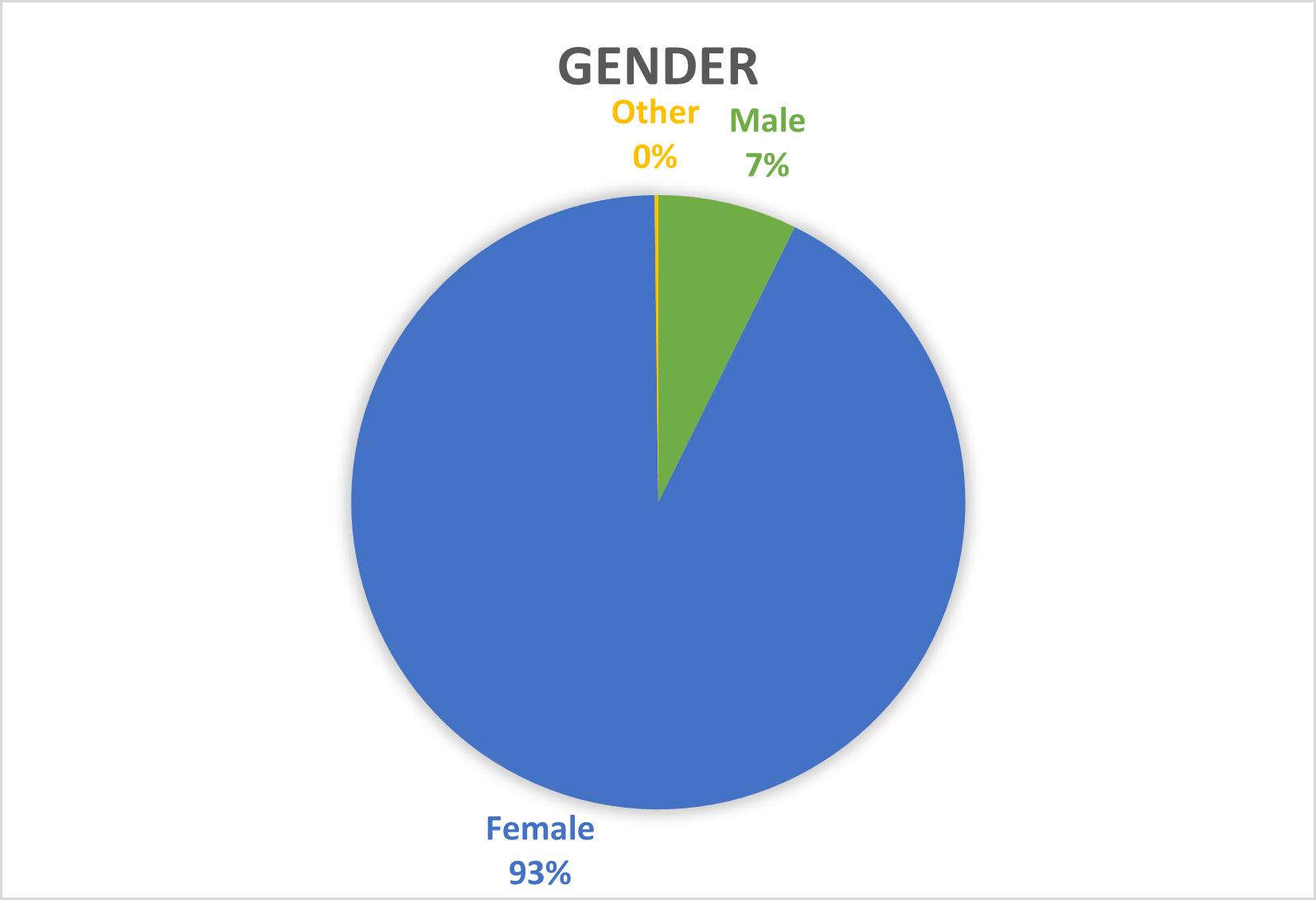
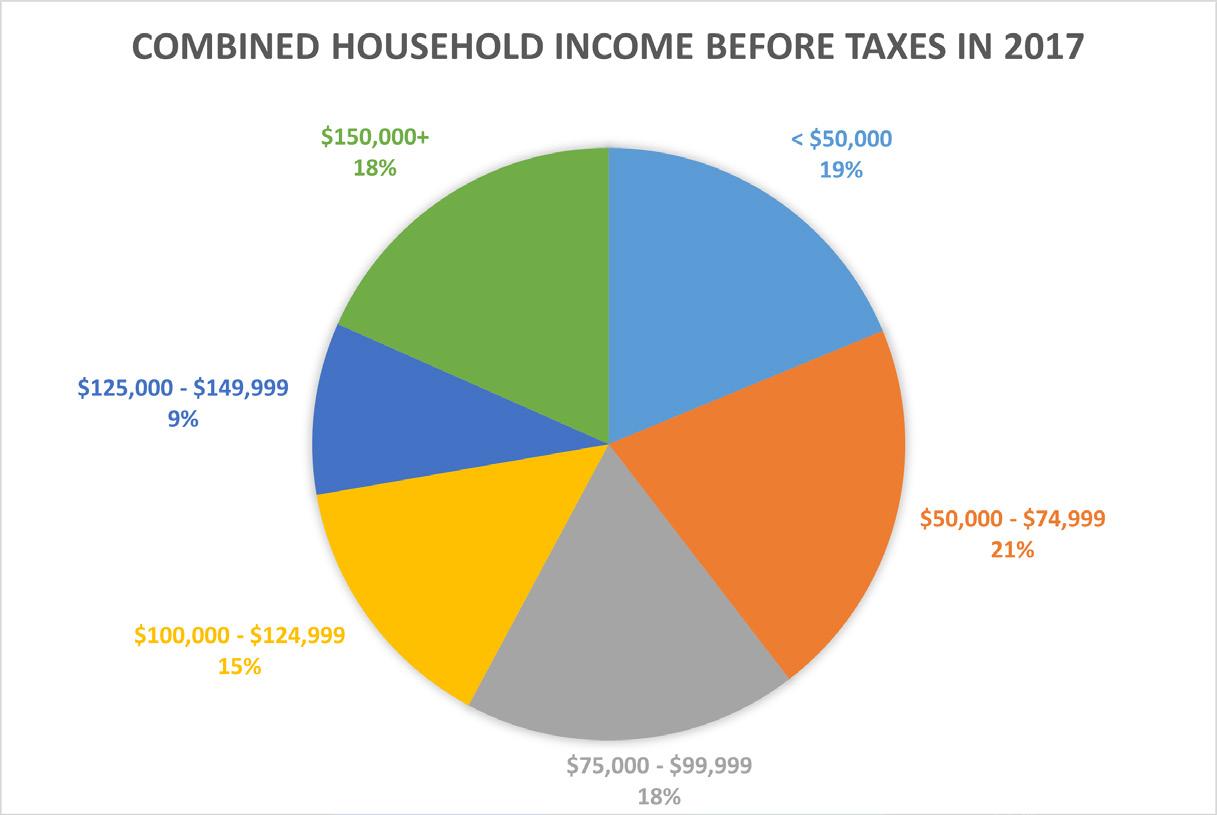
GRAPHICS COURTESY AMERICAN HORSE PUBLICATIONS.
decrease, standing at 28.5% compared to 29.7% in 2018, 31.5% in 2015 and 34.7% in 2012. Of vaccination-related issues discussed with the veterinarian, the most common is what the horse is being vaccinated for (63.7%), followed by American Association of Equine Practitioners (AAEP) vaccination recommendations (40.6%). Since the 2018 survey, horse owners and veterinarian conversations surrounding vaccination protocols have decreased. More than 72% of respondents indicate that their veterinarian is the leading influence for where they purchase their equine vaccines, with price being the second leading influence (13.3%).
DEWORMING
Respondents indicate that they are adhering to new deworming recommendations. The percentage of horse owners who are deworming one to three times a year has increased, while the percentage of those who are deworming up to six times a year has decreased. More than half of respondents (54.4%) indicate their veterinarian is involved in developing their horses’ deworming schedules—the first time this figure has eclipsed the 50% mark. Survey results indicate that just under 60% of respondents report their veterinarians recommend a fecal egg count test, declining from nearly 78% in 2018. Respondents indicate that they purchase dewormers from chain stores, local feed stores and online. Veterinarians are reported to have the most influence on dewormer purchasing decisions and their role has become more prominent than indicated in previous studies.
TIMING OF SURVEYS CAN BE MEANINGFUL
The 2021 AHP Equine Industry Survey continues to build upon the first four surveys (2009-2010, 2012, 2015 and 2018) to help understand dynamics within the equine industry. The initial survey was conducted as recovery from the Great Recession in ’08 and ’09 was underway, and the following two surveys were able to track recovery in the equine industry. “The timing of the 2021 survey is fortuitous because it comes on the heels of a worldwide economic slowdown due to the global COVID-19 pandemic—a health event not seen in more than a century,” said Stowe. “Accordingly, it can serve as an important benchmark in the health of the equine industry now and in the future.”
ABOUT THE SURVEY
The 2021 survey was limited to those who currently own or manage at least one horse, are 18 years of age or older and live in the United States. The survey collected 8,029 responses, of which 7,267 were useable. “Zoetis is proud to support the ongoing work of American Horse Publications and its significant efforts to understand the trends impacting our industry,” said Jen Grant, head of marketing for U.S. equine, Zoetis. “To see a stable U.S. horse population despite the many challenges of COVID-19 is a testament to the powerful connection between horses and their caregivers—a bond we are committed to nurturing now and into the future through our trailblazing portfolio of horse care products.” “AHP is grateful for its partnership with Zoetis to provide ongoing and vital data on the trends in horse care, management and welfare of horses in the U.S.,” said Christine W. Brune, AHP executive director. “We appreciate the cooperation of our members in promoting the survey and the expert analysis of Dr. Jill Stowe.”
About American Horse Publications
AHP has united equine-related publishing media, businesses, professionals, colleges, and students for over 50 years. The non-profit professional association promotes excellence in equine publishing media and encourages relationships and communication to increase interest in the horse industry. For more information, visit www.americanhorsepubs.org.
About Zoetis
As the world’s leading animal health company, Zoetis is driven by a singular purpose: to nurture our world and humankind by advancing care for animals. After nearly 70 years innovating ways to predict, prevent, detect, and treat animal illness, Zoetis continues to stand by those raising and caring for animals worldwide—from livestock farmers to veterinarians and pet owners. The company’s leading portfolio and pipeline of medicines, vaccines, diagnostics, and technologies make a difference in over 100 countries. In 2020, Zoetis generated revenue of $6.7 billion with ~11,300 employees. For more, visit www.zoetis.com. Zoetis has been committed to providing horse care you can count on for more than 65 years. Our team includes numerous equine veterinarians and other experts who are inspired daily by the opportunity and profound responsibility to support horses, the owners who love them, and the equine veterinarians and other care team members who safeguard their wellbeing every day. Whether at the clinic or in the field, Zoetis is always by your side with a comprehensive, innovative portfolio of products and services for horses at every step of a horse’s care and throughout the journey of a horse’s life.
| Source: 2021 AHP Equine Industry Survey sponsored by Zoetis.
Information from the July 26 American Horse Publications News Release. More information can be found at the AHP website: https:// www.americanhorsepubs.org/2021equine-survey/.



